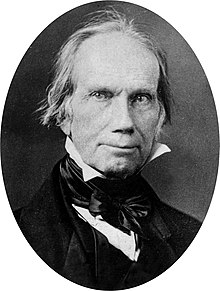Henry Clay, Sr.
| Henry Clay Sr. | |
|---|---|
 |
|
| 9th United States Secretary of State | |
|
In office March 4, 1825 – March 4, 1829 |
|
| President | John Quincy Adams |
| Preceded by | John Quincy Adams |
| Succeeded by | Martin Van Buren |
|
United States Senator from Kentucky |
|
|
In office March 4, 1849 – June 29, 1852 |
|
| Preceded by | Thomas Metcalfe |
| Succeeded by | David Meriwether |
|
In office November 10, 1831 – March 31, 1842 |
|
| Preceded by | John Rowan |
| Succeeded by | John J. Crittenden |
|
In office January 4, 1810 – March 3, 1811 |
|
| Preceded by | Buckner Thruston |
| Succeeded by | George M. Bibb |
|
In office December 29, 1806 – March 3, 1807 |
|
| Preceded by | John Adair |
| Succeeded by | John Pope |
| 7th Speaker of the United States House of Representatives | |
|
In office March 4, 1823 – March 3, 1825 |
|
| Preceded by | Philip P. Barbour |
| Succeeded by | John W. Taylor |
|
In office March 4, 1815 – October 28, 1820 |
|
| Preceded by | Langdon Cheves |
| Succeeded by | John W. Taylor |
|
In office March 4, 1811 – January 19, 1814 |
|
| Preceded by | Joseph B. Varnum |
| Succeeded by | Langdon Cheves |
| Member of the U.S. House of Representatives from Kentucky |
|
|
In office March 4, 1823 – March 6, 1825 |
|
| Preceded by | John T. Johnson |
| Succeeded by | James Clark |
| Constituency | 3rd district |
|
In office March 4, 1815 – March 3, 1821 |
|
| Preceded by | Joseph H. Hawkins |
| Succeeded by | Samuel H. Woodson |
| Constituency | 2nd district |
|
In office March 4, 1813 – January 19, 1814 |
|
| Preceded by | Samuel McKee |
| Succeeded by | Joseph H. Hawkins |
| Constituency | 2nd district |
|
In office March 4, 1811 – March 3, 1813 |
|
| Preceded by | William T. Barry |
| Succeeded by | Samuel Hopkins |
| Constituency | 5th district |
| Personal details | |
| Born |
April 12, 1777 Hanover County, Virginia, U.S. |
| Died | June 29, 1852 (aged 75) Washington, D.C., U.S. |
| Political party |
Whig (1833–1852) National Republican (1825–1833) Democratic-Republican (1803–1825) |
| Spouse(s) | Lucretia Hart (m. 1799) |
| Children | 11, including Thomas, Henry, James, John |
| Alma mater | College of William and Mary |
|
|
Henry Clay Sr. (April 12, 1777 – June 29, 1852) was an American lawyer, planter, and statesman who represented Kentucky in both the United States Senate and House of Representatives. After serving three non-consecutive terms as Speaker of the House of Representatives, Clay helped elect John Quincy Adams as president, and Adams subsequently appointed Clay as Secretary of State. Clay served four separate terms in the Senate, including stints from 1831 to 1842 and from 1849 to 1852. He ran for the presidency in 1824, 1832 and 1844, and unsuccessfully sought his party's nomination in 1840 and 1848. Clay was one of a handful of national leaders to actively work from 1811 to the 1850s, defining the issues, proposing nationalistic solutions, and creating the Whig Party.
Clay was born in Hanover County, Virginia, in 1777. His family moved to Lexington, Kentucky, in 1797. In Lexington, he established a flourishing legal career and won election to the state legislature as a Democratic-Republican. Clay moved onto the national scene with two brief stints in the Senate, and election to the House of Representatives in 1810; he promptly was elected Speaker. A leading war hawk, Speaker Clay helped lead Congress into declaring the War of 1812 against Britain. In 1814, Clay helped negotiate the Treaty of Ghent, which ended the War of 1812. After the war, Clay developed his American System, which called for an increase in tariffs to foster industry in the United States and the use of federal funding to build infrastructure. He helped launch a strong national bank and defended it against attacks from President Andrew Jackson. After unsuccessfully running for president in 1824, Clay helped Adams win the 1824 contingent election in the House of Representatives. Jackson denounced Clay's role in Adams's victory, as well as Clay's subsequent appointment as Secretary of State, as a "corrupt bargain".
...
Wikipedia
